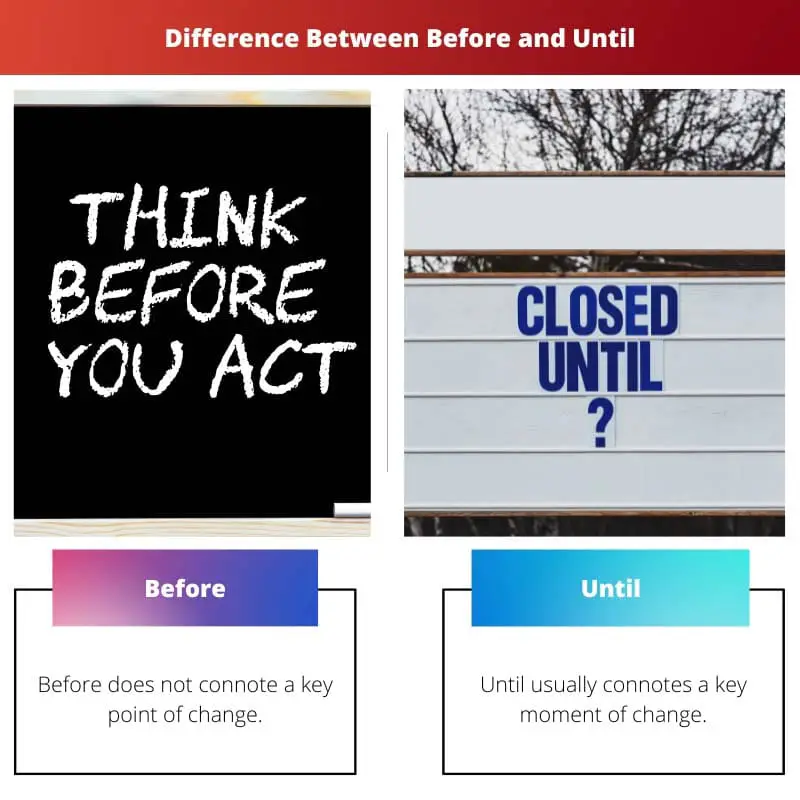Conjunctions, prepositions, and adjectives are a pivotal part of everyday communication. It is necessary to ensure that the right type of connector is used to convey the exact meaning.
The words before and until are two such words that are mixed up together. However, it should be noted that these words are not alike.
Key Takeaways
- “Before” is a conjunction or preposition that indicates an event or action occurred earlier than another.
- “Until” signifies that an event or action continues up to a specific point, after which it stops or changes.
- Using “before” emphasizes the order of events, while “until” highlights the duration or continuation of an event or action.
Before vs Until
The difference between before and until is that before does not refer to a key point of change. For example, eat the food before it gets cold. Although it is going to happen, there is no specific time of occurrence. On the other hand, the word until connotes a key point of change. For instance, you are not going anywhere until you put your things away.

Before describes the occurrence of an event before another event, person, thing, or place in time. For instance, I arrived for the football match before all my teammates did.
When the word before denotes position, it may refer to ahead of, in front of, or in advance of. For example, Aliza was standing before James in the class prayer.
The word until is used to indicate the continuance of an action or a condition till a specified time. For example, Jack stayed at his friend’s place until it was dark.
The word until serves both as a conjunction and a preposition. In fact, until was widely used as a preposition from the 13th century onwards.
Comparison Table
| Parameters of Comparison | Before | Until |
|---|---|---|
| Origin | The word before originates from the Germanic word bevor. | The word until originates from the Old Norse und which means as far as. |
| Meaning | Before does not connote a key point of change. | Until connotes a key moment of change. |
| Synonyms | Some synonyms of before are beforehand, earlier, previously, prior to, and anteriorly. | Some synonyms of the word until are till, up to, and as far as. |
| Antonyms | Antonyms of before are after, afterward, later, and following. | An antonym of until is beyond. |
| Example | I will eat the lunch before it gets cold. | I will study until the guests arrive. |
What is Before?
By definition, before is an adverb and adjective that means in advance. Before describes the occurrence of an event before another event, person, thing, or place in time.
For instance, Raven arrived at the cinema hall before Clovia did. Another example is the partition of India occurred before Jonathan was born.
Before can also mean in precedence of or in order of rank. For example, I place my family before my wealth. When the word before denotes position, it may refer to ahead of, in front of, or in advance of.
For instance, Jack stood before that gate gazing outwards. Another example is that I stood before Micahel in the school assembly.
The word before originates from the Germanic word bevor. The synonyms of before are beforehand, earlier, previously, prior to, preliminary to, formerly, antecedently, and anteriorly.
In addition, the antonyms of before are after, afterward, later, and following. The use of the word before as an adjective, adverb, and preposition began even before the 12th century.
It was only from the 13th century onwards that the word before was used as a conjunction. As a conjunction, the word before means previous to the time when another event occurs.
For example, please bring the official documents before we leave. Thus, before serves several uses in modern English.
What is Until?
By definition, the word until is used to indicate the continuance of an action or a condition till a specified time. For example, the police weren’t willing to leave the street until they found the thief.
Another example is please stay in this room until I get back from work. The word until, thus, serves both as a conjunction and a preposition.
The word until is used to connote the time till which an event will last. Consider, for example, the sentence Rachael studied for his Physics exam until it was time to go to work. Here, the event that is studying occurs till the time Rachael does not have to go to work.
The word until originates from the Old Norse und which means as far as. The synonyms of the word until are till, up to, and as far as.
The antonym of the word until are beyond. Furthermore, the word until was widely used as a preposition from the 13th century onwards.
The use of the word until as a conjunction only began from the 14th century. An example of until as a conjunction is Monica loves to read until it is time to go to bed.
Another example is the Thompsons did not arrive until the meeting was half over. To conclude, the word until serves several practical purposes.

Main Differences Between Before and Until
- The word before originates from the Germanic word bevor. On the other hand, the word until originates from the Old Norse und which means as far as.
- Some synonyms of before are beforehand, earlier, previously, prior to, and anteriorly. In contrast, some synonyms of the word until are till, up to, and as far as.
- While the antonyms of before are after, afterward, later, and following, an antonym of until is beyond.
- Before does not connote a key point of change. In contrast, until connotes a key moment of change.
- An example of before in a sentence is go to bed before it gets too late. In contrast, an example of until in a sentence is I will work until it is time for me to sleep.


The detailed etymological explanation of ‘before’ and ‘until’ could have been shortened. It feels like a bit too much information for the content of the article.
The provided references significantly add to the credibility of this article. The etymological details give a nuanced understanding of the words ‘before’ and ‘until’.
This article does a great job explaining the difference between ‘before’ and ‘until’. The examples are very helpful and the readers are sure to understand the meaning of each word now.
I agree with you Ghunt. The examples make it clearer to understand the practical use of ‘before’ and ‘until’.
The article is quite comical in its approach to explaining the differences between ‘before’ and ‘until’, especially with the usage examples. It keeps the reader engaged.
Excellent compilation! This article beautifully and systematically explains the fine line of difference between the two words that are often confused by writers. This article is indeed more informative than the dictionary and thesaurus available online.
I don’t agree with the argument that ‘before’ does not connote a key point of change and ‘until’ does. The examples provided for ‘before’ in the article also indicate a key point of change.